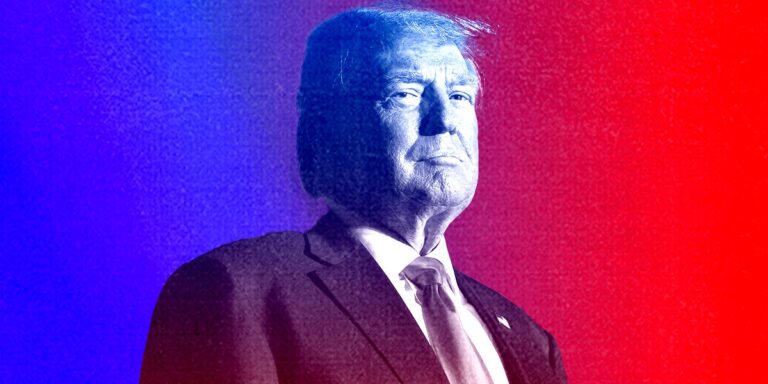- Over the past 18 days, the 2024 election race has shifted completely — in Trump’s favor.
- It started with Biden’s debate failure and the two weeks of infighting within the Democratic establishment that followed.
- Having just survived an assassination attempt, he has now achieved victory in his document case.
There’s no denying it: Donald Trump is enjoying incredible luck.
The former president heads into this week’s Republican National Convention with the political wind at his back, fresh off an assassination attempt as Democrats grapple with whether to stick with President Joe Biden after his poor debate performance.
On Monday, Trump scored another victory, at least for now: Judge Aileen Cannon dismissed the federal government’s classified documents case against him.
Polls show Trump’s lead over President Joe Biden continues to grow, and it’s hard to see how Democrats can turn things around. It may be the luckiest 18 days any presidential candidate has ever had.
June 27: Biden debate meltdown
We all know it by now: The first debate was an unmitigated disaster for Biden, with the president looking weak, stumbling over his words and occasionally uttering nonsensical phrases.
Biden’s performance reinforced long-standing concerns among voters, including many Democrats, that the president is too old to run again. Trump may be only a few years younger than Biden, and he lied a lot in the debate, but he delivered a performance that was spirited enough to keep the focus on Biden.
More damaging for the president was the debate over the next two weeks, with Democrats engaging in public disagreements over whether Biden was still their best chance of defeating Trump.
Twenty Democratic House members and one Democratic senator have publicly called for Biden to withdraw from the race, while several others have simply observed that unless there is a course correction, Trump will likely win the election in November.
The discussion largely went quiet after the assassination attempt on Trump, but it is unlikely to stop completely, especially if subsequent events lead to a continued surge in polls for the former president.
July 13: Surviving an assassination attempt
At a rally in Butler, Pennsylvania on Saturday, Trump narrowly avoided an assassination attempt on him.
In one sense, Trump was lucky he didn’t die: One of the shooter’s bullets hit him in the ear. If he had moved even slightly to the right, he might have been seriously injured.
“I shouldn’t be here, I should be dead,” Trump told the New York Post. “Whether it’s luck or God, a lot of people say it’s God I’m still here.”
But there is no denying the political advantage the assassination attempt gave Trump.
While he and his allies have long inflamed political violence — most notably the January 6 attack on the U.S. Capitol — the fatal error allowed Trump to flip the script and credibly portray himself as the victim of political violence, even if the shooter’s motives remain unclear.
On Sunday, Trump said he would deliver a speech focused on unity, rather than attacking Biden, on Thursday at the RNC.
There is also the enduring power of the image of Trump raising his fist at a rally immediately after he was shot.
The images are likely to be a powerful motivator for his supporters, and fuel enthusiasm in the run-up to the election.
July 15: Judge dismisses Trump’s secret documents case
On Monday, Trump received more good news.
Judge Aileen Cannon dismissed the federal government’s classified documents case against Trump, ruling that the appointment of special counsel Jack Smith was unconstitutional.
The case, widely considered the strongest case against a former president, is not over. Smith is likely to appeal the judge’s decision, and it could ultimately be decided by the Supreme Court.
But at the very least, Cannon’s move delayed the case further and provided an important morale boost for the president and his supporters heading into the convention.
It also underscores the lasting impact Trump’s first term has had on America’s justice system: Cannon was nominated by Trump in 2020 and confirmed by the then-Republican-controlled Senate later that year.


